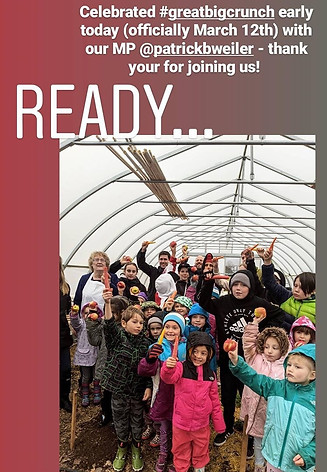BC Chapter Advocacy

There’s a strong history of school food advocacy and activity in BC. This collective effort of parents, teachers, principals, public health dietitians, elected officials, and community organizations has culminated in some major wins for school food.
Current BC Chapter advocacy activities
The Coalition is grateful for the historic investment in school food in BC Budget 2023! To maximize the impact of this Feeding Futures funding, we are recommending the BC Government:
-
Fund for provincial and regional support networks
-
Advocate for matching funds from the Government of Canada
-
Invest in local food procurement incentive pilots
For more information, see our 2024 BC Budget Consultation Submission and Feeding Futures recommendations.
View current Coalition advocacy campaigns here, or email bcschoolfood@phabc.org for support in reaching out to your local elected officials in support of the Coalition’s work.

Great Big Crunch with the BC Liberal caucus in February 2020.

Great Big Crunch with the BC NDP caucus in February 2020.

Former Ministers Lana Popham and Rob Fleming visited LunchLAB, a school food program in Vancouver developed by Coalition members Fresh Roots and Growing Chefs! (photo credit: Lana Popham)

Great Big Crunch with the BC Liberal caucus in February 2020.
Past BC Chapter advocacy activities
2023
The BC Chapter celebrated the BC Government’s announcement of $214.5 million over 3 years! We supported the creation of resources for school districts to build new and expanded programs using Feeding Futures funding, and connected with school districts across the province.
We also submitted our 2024 BC Budget Consultation submission.
2022
In February, the BC Chapter wrote our 2022 recommendations for a school food program for BC to advise the Government of British Columbia on next steps to take to advance their mandates to “create more local school meal programs” for K-12 students.
In June, the BC Chapter submitted our 2023 BC Budget Consultation Submission, which included an ask for the BC Government to “cost out and fund the first phase of a universal, healthy school food program for K-12 students in BC”. We also launched a public campaign to mobilize BC Chapter members, endorsers and supporters; this resulted in hundreds of submissions, presentations, and letters urging decision makers to fund school food in Budget 2023.
2021
The BC Chapter submitted our 2022 BC Budget Consultation Submission, which asked for dedicated funding for district-wide school food coordinators, funding to pilot school food programs across BC, and supportive governance structures.
We also worked on building relationships with and mobilizing youth, parents, teachers, trustees, school and district staff and many others. We shared local stories and ideas and needs with decision makers; we invited MLAs and MPs to visit school food programs; and we met as a network of school food practitioners to share knowledge, resources, and updates.

Coalition member Squamish CAN celebrated the Great Big Crunch with MP Patrick Weiler.

BC-CHSF Provincial Coordinator Sam Gambling, Nourish Cowichan ED Fatima Da Silva and CRFAIR ED Linda Geggie presented to the BC Finance Committee in June 2022.
2020
The BC Chapter released a report on Feeding Students During COVID-19, which highlighted the importance of school meals in supporting food access for children, and the value of social safety nets and institutional support in British Columbia.
2019
The BC Chapter visited the BC legislature as part of our Great Big Crunch campaign, and met with all 3 political party caucuses. We asked all parties to put school food in their election platforms.
2018
The BC Chapter was formed when four organizations from BC (Fresh Roots, BC Food Systems Network, Vancouver Food Policy Council, and PHABC) came together to discuss how to mobilize existing networks across the province to support the Coalition’s advocacy. We received a grant from Vancouver Foundation to support provincial organizing.
Indigenous School Food Advocacy
Western colonial food and education systems have long been a source of harm and violence to Indigenous peoples. The 200+ distinct First Nation and Métis communities in B.C. each have their own unique histories, cultures, traditional foods and ways of knowing that have been profoundly impacted by residential schools, displacement, and ongoing colonization. As stated in this Canadian Feed the Children report, First Nations household food insecurity is 3-5x higher than in the general Canadian population - this is a direct result of colonization and racism.
The BC Chapter recognizes the need and role for federally- and provincially-funded school food programs to reconcile this colonial history.
We are advocating for federal, provincial and territorial governments to Commit to Indigenous Control over programs for Indigenous students. This includes:
-
embedding Indigenous food sovereignty principles into school food programs;
-
negotiating distinctions-based funding for school food programs with First Nations, Métis and Inuit leaders.
See our vision for Indigenous-led school food programs here.

